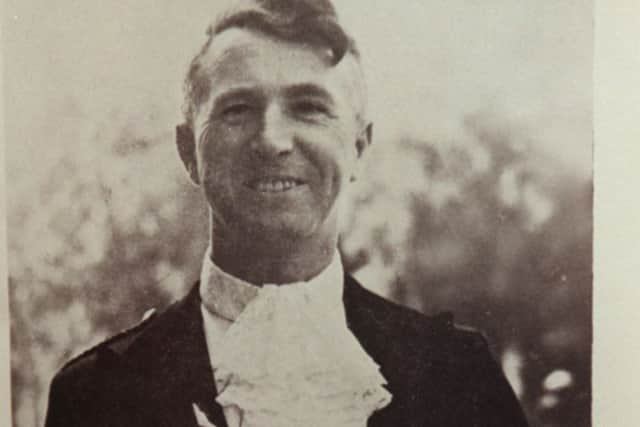Play to tell story of Tartan Pimpernel, Scotland's war hero


Now, a new play is to celebrate the remarkable life of the Rev Dr Donald Caskie, one of Scotland’s most valiant wartime figures.
The Church of Scotland minister, who became known as the Tartan Pimpernel, was working at the Scots Kirk in Paris when the Germans invaded France in 1940.
Advertisement
Hide AdHaving routinely denounced the Nazis from his pulpit since arriving in Paris two years previously, he found himself in danger’s way. He was forced to flee his mission and the city, though not before leaving behind in the vestibule a spring of white heather from his native Islay.


The crofter’s son decamped to southern France where he refused the opportunity of safe passage on the last ship bound for Britain, instead making his way to Marseille.
There, he set up base in a deserted British Seaman’s Mission, and with the help of volunteers, set up hiding places in the building’s attic, foundations, and wall cavities to provide refuge for stranded soldiers.
He debriefed those who escaped of any vital intelligence, recording the information in his native tongue. “After all,” he reflected years later,” who in Marseilles but God and Donald Caskie could read the Gaelic?”
The operation was fiercely scrutinised by the Vichy Police, but Caskie was able to provide his compatriots with civilian clothing, and help them towards freedom across the Pyrenees and into Spain. He would sent telegrams to the Kirk in Edinburgh, alerting them of who was on their way back to Britain.


Eventually, Caskie’s talents and fearlessness saw him recruited by British intelligence, who told him that his mission was the last link of a chain of safe houses stretching all the way from the beaches of Dunkirk to Marseille.
Advertisement
Hide AdCaske’s 1957 account of his time in France, The Tartan Pimpernel, was a bestseller, but surprisingly, it has inspired few artists to interpret the story over the years. John Hughes, a playwright from Glasgow, hopes to put that right.
His production, also named The Tartan Pimpernel, is ultimately a study of Caskie’s character, not least his compassion.
Advertisement
Hide Ad“I think his actions were down to his humanity and his faith,” said Hughes. “He wasn’t driven so much by a sense of patriotism, as he would just as readily help French nationals.
“I’ve never been a fan of flag-waving, and I don’t think Caskie was either, so I wanted to tell a very human story set in an adverse situation.”
The one act play also covers the demise of Caskie’s Marseilles operation after he was betrayed by Paul Cole, a double agent. The minister was given a two year suspended prison sentence, and banished from the city.
The encounter, however, did not dissuade him from what he saw as his mission. Refusing another chance of repatriation, Caskie relocated to Grenoble, assumed the cover of a university chaplain, and in defiance of his intelligence handlers and the Kirk, set about helping more Allies get out of France.
Their warnings were to prove prescient, however, and in April 1942, the Germans caught up with Caskie. He was eventually sentenced to death by the Gestapo.
Tortured and imprisoned as he awaited execution, it was only the intervention of a German Lutheran pastor, Hans Helmut Peters, which spared his life, and Caskie spent the rest of the war in a prisoner of war camp.
Advertisement
Hide AdHe returned to the Scots Kirk until 1961, before coming back to Scotland. After a series of postings in Inverclyde and Ayrshire, he died in 1983 aged 81, and was laid to rest at Kilarrow Church in Bowmore.
Hughes, who hopes to stage the play in Islay, believes Caskie was treated somewhat “shabbily” in the twilight of his life, but hopes his play will enlighten a new generation as to his wartime exploits.
Advertisement
Hide Ad“I think there will be a lot of people who don’t know Caskie’s story,” he added. “We’re perhaps guilty in Scotland of not celebrating our own heroes, so it’s good to tell people about his life and times.”
The Tartan Pimpernel is being staged on 20 May at The Bungo in Nithsdale Road, Glasgow, as part of the Southside Fringe festival. Tickets cost on the door will cost £8 , and can also be bought in advance via www.tickets-scotland.com